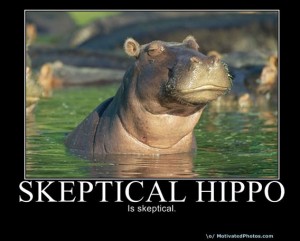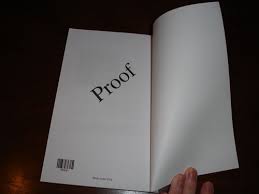 Skin That’s Thick and Thin: Some Advice for Writers
Skin That’s Thick and Thin: Some Advice for Writers
One cliché bit of advice doled out to writers (and actors, artists, politicians, and various other people who elect professions where they face a lot of criticism) is that they should grow a thick skin. Like rhinos, perhaps. Or crustaceans of some kind. The assumption is that this will make us more successful. That might be true. Perhaps due to our society’s conflation of financial success and happiness, there’s also an underlying implication that this thick skin will lead to happiness. Or to better art.
I am unpersuaded.

This week, I hung out with a friend who had a particular verbal tick. In the midst of conversation, he’d say, “I don’t care about that.” This struck me as a harsh way to segue from one subject to another, or to make a point. This tick can be partly explained by the fact that English is his third language; a native speaker, learning English as a child with less strongly formed opinions, might have learned some gentler way to say, “I disagree,” or “Well, I’m not sure that’s relevant to the point at hand.” This friend simply and boldly asserted that he didn’t care. He even doubled-down, voicing his admiration for a particular writer who had achieved great success by promoting unpopular theories due to his complete disregard for the opinions of critics or academics who disagreed with him.
I shared my current dilemma. My novel comes out in a little over a month, and I can’t help but hope that readers enjoy it. I attributed this to a personality flaw. “I’m a people-pleaser,” I told my friend, as though making a confession to a habit of cannibalism or necrophilia. My confessor encouraged me to go and sin no more, to grow a thick skin, to not give a -well, he didn’t use the word “care” that time- let’s just say he advised me not to donate any carnal acts to critics.
On the surface, this seems like good advice. Why should a writer allow himself/herself to be cut to the core by the rantings of some Greenwich Village hipster he’ll never meet, the invective of a mommy-blogger who was too distracted by her children to read the book carefully, the ad hominem insults of a sixteen-year-old who likes to post nasty reviews on Amazon just to see if he can get a reaction?
Why? Because those three people are readers! The guy from the village walks down to Washington Square Park, finds an empty bench, and he reads!Reader at Washington Square Park The stay-at-home mom carves out the few precious minutes when both her kids are napping, and she reads! The kid on Amazon… okay, he’s really a 35 year-old troll who lives in his mom’s basement, and he doesn’t really read novels, but his life is sad and he deserves some sympathy. Though the writer may never meet them, the guy in Washington Square Park and the woman sitting on her toilet next to the baby monitor… They are the reason he writes. Their opinions matter, not just because they are human beings with intrinsic worth, but because they read the book. If the writer doesn’t care about that, he should stick to journaling.
But this is an over-simplification as well. I never want to achieve “universal acclaim.” First of all, if everyone knows that a book is good, they file it away as a “classic,” a book everyone has heard of and no one is excited to read. Second, if the world of literary criticism ever becomes so homogeneous in its thinking that there are no contrarian voices, the whole pursuit becomes something I’d prefer to avoid. I hope for some bad reviews. By all the gods, I’d love to have a few high profile bad reviews. But only because they would drive more people to the book. I want the majority of readers to enjoy it. At least 51%. There. I’ve confessed. I want it to be (gasp) popular.
Having a thin skin may actually help in that department. Thin skin may be fragile, but it’s also sensitive. It feels effectively. Absorbing that information allows the writer to more accurately predict what might be pleasing to the reader. Consider, who would you rather curl up next to on a thick rug in front of a roaring fire, a beautiful woman/man with very sensitive skin, or the aforementioned rhinoceros? I would hypothesize rhino chargingthat the human is more likely to be able to satisfy your sexual desires, but I don’t know what you’re into.
Still, despite Stephen King’s assertion, writing isn’t seduction. A desire to be sensitive to reader’s tastes can lead to trend-chasing, a bad habit that has bred a thousand Twilight knock-offs which should have stayed hidden away in fan-fiction forums. Trend-chasers are about as seductive as the kid in middle school who asked every single girl to the dance and found out they were all planning on washing their hair that night. A writer has to have some small measure of self-respect.
After writing a handful of novels, I finally decided this was the one to publish not just because I’d honed my craft to a point I could be proud of, but because this book was my bravest one yet. I was able to put the disapproval of my grandmother out of my mind on some previous projects, but this time I was finally able to risk the disapproval of my parents, my dearest friends, even my wife, because I was nine-and-a-half months pregnant with a story that just had to come out. As I wrote it, I caught myself thinking, “Oh, that line is going to piss-off Christians,” and “Oooo, Muslims won’t like this chapter very much,” and “Some atheists won’t appreciate that crack,” and “Dammit. There go the Orthodox Jews.” I didn’t set off to offend religious people. Most of my favorite people are adherents of one religion or another. The book will only offend the kind of believers who lack a sense of humor. Luckily for me, they aren’t known for their habit of searching out opinions that disagree with their own. Scary Westboro BaptistBut they are the scariest kind of believers! Their bad reviews sometimes take the form of bullets. I was aware of that. I couldn’t let it stop me, though. I was processing the loss of my own faith, and I had to turn that pain into something positive, even fun, for myself. Then I discovered that the story I needed to tell myself was a good one, one that others might enjoy. 
I couldn’t back down from the story, but I couldn’t ignore my audience either. If I was going to make it available for them, it had to be more than a story for my own benefit. I had to revise and edit. Those phases are the least popular among writers precisely because they exist to serve the reader’s needs, not the writer’s pleasure. I can’t overstate their importance, though. Not only did a willingness to revise, to truly “see again,” deepen my own experience of the story, it made the novel into something I’m far more proud of. And editing? Editing doesn’t build pride; it prevents shame. Now I’m neck deep in online writer’s groups where we share marketing ideas, and I am constantly amazed by the number of writers who post ungrammatical, misspelled, incorrectly punctuated comments online. Sure, these might be informal forums, but we’re writers, for Valhalla’s sake! Every typo is an offense to potential readers. I paid good money to hire an editor to save me from any of those mistakes in my book. You can bet I’m going to try to communicate that level of quality to potential readers in every online post.
So, if this novel is any kind of model, writing should have some measure of swagger. It should be hard at its core but soft on the outside. It should be confident but also sensitive. On second thought, I guess Stephen King was right about seduction.
In my life, my need to please others has led to my most embarrassing moments (made all the more excruciating by the fact that I’m so sensitive to embarrassment), my most ill-conceived blunders (desperate, impulsive attempts to win favor), and my most shameful acts (failed efforts to make people like me at the expense of others). However, the same impulse has led to my greatest successes. When I wanted the approval of the right people and went about acquiring it in the right way, I not only found my greatest joys but brought the most joy to others. Furthermore, my need to please demands that I look for the good in people, give them the benefit of the doubt at every turn, and though this has burned me quite a few times, it’s also proven to be a good bet; most people, it turns out, are worth pleasing.
My paper-thin skin may be sliced to ribbons shortly after the book hits shelves. I certainly won’t participate in a public melt down like some have. I plan to take the best advice I’ve heard about book reviews: Say Nothing. If it’s bad, Say Nothing. Maybe have a good cry or a stiff drink. If it’s good, Tweet it, Facebook it, send everyone to it, but on the page itself, Say Nothing. Here’s what I’d like to say to a reviewer, though: “Thank you for reading the book. If you didn’t like it, I’m sorry I failed you. Truly sorry. If you liked it, that makes the whole process of revision and editing and publishing worthwhile. But, either way, I care about you, and I’m grateful for you.”
So here’s my current advice for writer, such as it is: Don’t grow thicker skin. Instead, change your clothes.
1) First, put on your best suit of armor. IRON MAN 3Climb into an M-1 Abrams Tank. Drive it into a nuclear submarine. Write like you are invincible. (Warning: People in suits of armor in tanks in submarines are lonely. And cold.)
2) Change into your shortest skirt. Revise for the reader. But remember Pretty Woman what you learned from the movie Pretty Woman: Don’t kiss on the mouth. Some things are off limits.

3) Put on a tuxedo. Adjust your cufflinks. Button the top button. Check your fly. Straighten your bow tie. Edit to protect yourself from shame.
4) Strip down to a swami’s loincloth and sit cross-legged under a tree for swamia while. Publish after a great deal of consideration.
5) Then, acknowledge that you’re basically naked. Run as fast as you can toward a garden of sweet, juicy blackberries and long thorns. Be willing to hurt.
That willingness to suffer shows more courage and more respect for the Runway Model Skin Apathyreader than any runway high-fashion name-brand rhino-skin apathy.
Ben Gorman is the author of ‘Sum of Our Gods’. The novel centres on Joe Miller, an atheist, who has a weekly coffee date with God. Joe’s grandfather offended Yahweh and earned his family a curse to the fourth generation. Joe represents the third, and wants more than anything to free his young son from the burden of listening to the Almighty gripe every week. As if that weren’t enough, Joe suspects his wife might be cheating on him . . . and some minor deities plan to oust Yahweh from power by starting an inter-religious war on Earth.
Benjamin Gorman is the author of The Sum of Our Gods, available November 22nd. For more information, check out www.TheSumOfOurGods.com
 I have just self-published a book using Createspace. It was quite easy as I used word to upload my file. Before uploading, I added page numbers to the word document, added a title page with copyright in my name, table of contents and introduction. I inserted a blank page between each chapter because that is how I wanted it. I also made sure that there were no headings at the bottom of a page. I made sure that my text started on the right as this is the norm for non-fiction books. At the end, I had references and an ‘About the author’ page. Once you have uploaded your book onto Createspace, you can see a digital proof of it. Look at this carefully before asking for a print copy of your proof. I made a couple of mistakes at first about how much space I wanted between chapters and headings but this wasn’t a problem as Createspace just allowed me to reload a file. The good thing is that they allow you to change and upload files as many times as you like. I made some more changes after I received the print proof copy of my book. It is worth getting a print copy as there are some things you just don’t notice on a digital proof. I am also really happy that I have a hard copy of my book. I went for a glossy cover and it looks great. Createspace added the ISBN code.
I have just self-published a book using Createspace. It was quite easy as I used word to upload my file. Before uploading, I added page numbers to the word document, added a title page with copyright in my name, table of contents and introduction. I inserted a blank page between each chapter because that is how I wanted it. I also made sure that there were no headings at the bottom of a page. I made sure that my text started on the right as this is the norm for non-fiction books. At the end, I had references and an ‘About the author’ page. Once you have uploaded your book onto Createspace, you can see a digital proof of it. Look at this carefully before asking for a print copy of your proof. I made a couple of mistakes at first about how much space I wanted between chapters and headings but this wasn’t a problem as Createspace just allowed me to reload a file. The good thing is that they allow you to change and upload files as many times as you like. I made some more changes after I received the print proof copy of my book. It is worth getting a print copy as there are some things you just don’t notice on a digital proof. I am also really happy that I have a hard copy of my book. I went for a glossy cover and it looks great. Createspace added the ISBN code.










